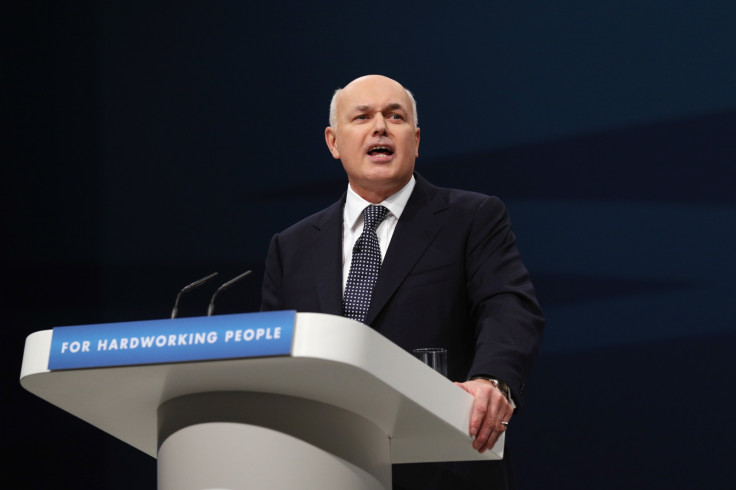General election 2015: Iain Duncan Smith unveils 'quiet revolution' for welfare reform

The Secretary of State for Work and Pensions has outlined his "quiet revolution" for welfare under a future Conservative government.
Iain Duncan Smith stressed that the next parliament must be about getting money flowing to "where it will have the most impact".
The senior Tory, speaking at an event hosted by thinktank Reform, also said there is still "much more" to do in order to "unleash the full potential of the so called social investment market".
"Broadly unnoticed amongst commentators in the media, we are developing a way to ensure that government – and local government – spending can be tied to outcomes," he added.
"Particularly for councils, as we look to the future, it means the end of going cap in hand to central government, reliant on ever-changing political whims and uncertain short-term grants.
"Instead, local Government will be able to leverage its own long-term investment, freed up from central control, to capitalise on what the Social Investment Taskforce have identified as the 'first trillion' of potential investment money."
Duncan Smith claimed that it has cost the current government £1tn ($1.5tn, €1.3tn) to deliver its health and education systems over the last five years.
"Just think what that money could mean on the ground, how many people it could help, how many lives it could transform," the Secretary of State said.
"The next parliament must be about getting money flowing to where it will have the most impact, with government reaping the benefits in return: innovative, efficiency, effectiveness.
"Over time, it is my hope that this will turn the tide in the whole culture of government spending – whereby we commission outcomes and pay for what work meaning every pound spent goes on positive life change for the most disadvantaged in our society."
Social impact bonds
Duncan Smith pointed to the government's use of social impact bonds (SIBs) of using the market in welfare reform.
The instruments enable social investors to fund particular service and the government pays them if an intervention is deemed successful.
Supports of SIBs argue that the instruments reduce government expenditure in the long-term.
The Department for Work and Pensions (DWP) has 24 SIBS running, 10 of them financed by the ministry's £30m Innovation Fund.
Duncan Smith estimated that these reforms could generate £500m of savings over the next parliament.
"In rolling out SIBs more widely, the government has done a lot to put the infrastructure in place: through Big Society Capital, the world's first social investment wholesaler and the social investment tax relief, which could generate up to nearly £500m over another five years," he said.
But Labour have claimed that the government has overspend on benefits and tax credits by "tens of billions of pounds".
"The current Conservative-led government has overspent on benefits and tax credits by tens of billions of pounds and failed to balance the books within the single parliament they promised," said Rachel Reeves, the shadow work and pensions secretary.
"This failure is a result of their fundamental failure to make work pay driving the up in-work benefit bill as well as undermining tax and national insurance revenues.
"Most worryingly, the current government has no plans to turn this around in the next parliament."
The comments come with less than 100 days to go before the general election in May.
The latest poll from YouGov for The Sun, which questioned more than 1,700 respondents between 2 and 3 February, put Labour and the Tories neck-and-neck on 33%, with the Liberal Democrats on 7%, Ukip on 14% and the Greens on 7%.
© Copyright IBTimes 2024. All rights reserved.






